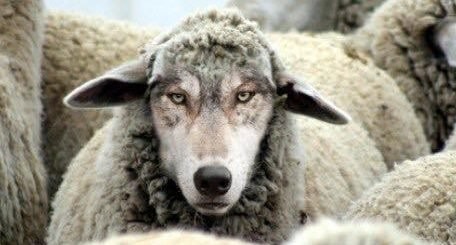
The Wolf in sheep's clothing (and how to spot one)
I have been running workshops on influencing and political savvy for several years. Increasingly those I have been working with have talked about the increasing pressure on their organisations (market pressures, reorganisations, cost savings etc.) and the fact that their organisation is becoming more and more political. We have talked about the different sorts of person in an organisation, the stubborn "mule" (who is reluctant to change), the hard-working "lamb" (who wants the best for the organisation but is less interested in self promotion) and - most recently - senior managers who are largely motivated to improve their own career and strengthen their power and influence.
Some call these "foxes." However, increasingly it is clear that these "foxy" managers will want to cover their tracks, resulting in the notion of the "wolf in sheep's clothing" : Managers and senior leaders who want to be seen to be interested in their organisation, but are even more interested in holding onto, or strengthening, their power and influence.
In a number of workshops recently we have had fun thinking about how to spot a wolf in sheep clothing. Here are some suggestions:
- Very focused upwards, like to attend high profile meetings; lobbying in the background to try to "fix" the outcome of meetings.
- Delegate the majority of the work, with directive challenging deadlines to subordinates, limiting the amount of help and support they give, so as not to have any weaknesses of their own capability revealed.
- Very keen to take the credit for what is done in much greater proportion than their actual role.
- May offer to act as a guide on high profile areas, ostensibly to be helpful, but mostly to influence the focus of work and learn about what is happening.
- Typically want to be able to keep their options open on contentious issues, so typically they will limit their response to e-mails on awkward topics (no reply or partial replies).
- May limit access to information (but with apparent good reason such as confidentiality or strategic importance), but mostly so that they can trade this for political gain, and to limit potential embarrassment to themselves.
- Will talk about the importance of staff development, but may limit/manage the access of subordinates to senior meetings/people, ostensibly because "an informal discussion" is preferable, but mostly so they can control what is communicated and flex this based on the reactions, and partly to avoid being out-shone.
- Interested to learn about the agendas of others - ostensibly to ensure alignment, but mostly, so they understand threats and opportunities from others .
- Will be prepared to talk about difficulties, problems and issues in other areas (rather than their own), to deflect negative attention.
- Able to deflect accountability and/or identify a scapegoat for issues that have arisen.
- When gaps are identified that they cannot ignore, keen to say that they had already instructed others to fix these earlier - and they will chase them again (with the opportunity of scapegoating others if needed if improvements are not delivered quickly).
The overall message is that the wolf in sheep's clothing will be able to quickly take credit when things go well, and equally be able to blame others if things do not go to plan.
In our influencing workshops we often conclude that in order to be successful "everyone needs to be a bit foxy some of the time", but an ethical leader will mostly be doing this for the development of their organisation, rather than just personal gain. However, increasingly, ethical leaders need to have a greater awareness of the presence of wolves in sheep's clothing in their midst and more capable of seeing the tell tale signs of the wolf in sheep clothing and more wary of their tricks, so that they don't receive a "swipe from behind".
And why isn't most leadership development and influencing focused on this subject? Because wolves in sheep clothing wouldn't want to educate innocent lambs about this, in order to keep them docile and in line.. !
Obviously there are many good and great leaders out there, but lets be more open about those that may not be all they seem to be and encourage greater dialogue and debate about ways to manage their adverse impact on organisations.. Feel free to contact me to come along to an influencing workshop. I'm increasingly seeing these are more like a Harry Potter "defence against the dark arts" course - but without the magic!
Your thoughts most welcome!
Director Deeper Green Services Ltd
7yManagement eh!? What would we do without you!??
Group Head of Operations at AfrAsia Bank Limited
7ywell written James